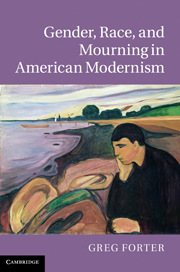Book contents
- Frontmatter
- Contents
- Acknowledgements
- Introduction
- 1 Gender, melancholy, and the whiteness of impersonal form in The Great Gatsby
- 2 Redeeming violence in The Sun Also Rises: phallic embodiment, primitive ritual, fetishistic melancholia
- 3 Versions of traumatic melancholia: the burden of white man's history in Light in August and Absalom, Absalom!
- 4 The Professor's House: primitivist melancholy and the gender of utopian forms
- Afterword
- Notes
- Index
2 - Redeeming violence in The Sun Also Rises: phallic embodiment, primitive ritual, fetishistic melancholia
Published online by Cambridge University Press: 21 April 2011
- Frontmatter
- Contents
- Acknowledgements
- Introduction
- 1 Gender, melancholy, and the whiteness of impersonal form in The Great Gatsby
- 2 Redeeming violence in The Sun Also Rises: phallic embodiment, primitive ritual, fetishistic melancholia
- 3 Versions of traumatic melancholia: the burden of white man's history in Light in August and Absalom, Absalom!
- 4 The Professor's House: primitivist melancholy and the gender of utopian forms
- Afterword
- Notes
- Index
Summary
The decline by the early twentieth century of a manhood combining competitive aggression with feminine feelingfulness might seem in Hemingway's case to have produced exactly the kind of response described by recent gender historians. The author's carefully cultivated image as an icon of rugged manliness; his well-known boxing exploits and penchant for big-game hunting; his habit of speaking and composing letters in what Lillian Ross called “Indian Talk” (“He read book all way up on plane,” Hemingway said to Ross of a traveling companion. “Book too much for him … She's better book than ‘Farewell.’”); the remorselessly hard-boiled construction of Hemingway's heroes, along with the stark, declarative simplicity of his prose, the effort to approximate linguistically that reduction into elemental forms that characterized Cubist painting – all of these can be read as signs that the social loss felt most keenly by Hemingway was that of male power and (an often racialized) primal force, which he then sought to recover as both personal attribute and aesthetic ideal.
Such a view has a certain purchase on The Sun Also Rises (1926) as well. The ideal of manhood envisioned by this novel seems at first glance far removed from the ambiguously gendered Gatsby, whose “sentimentality” is “appalling” (to Fitzgerald) partly because of its evident appeal. That sentimentality is here split off and deposited in Robert Cohn, cleansing the novel's heroic manhood – Pedro Romero's – of anything despicably feminine, and making it possible to figure him as the bearer of unimpeachable manliness: physical courage, personal honor, and a disciplined, craftsman-like mastery of his “art.”
- Type
- Chapter
- Information
- Gender, Race, and Mourning in American Modernism , pp. 54 - 95Publisher: Cambridge University PressPrint publication year: 2011



